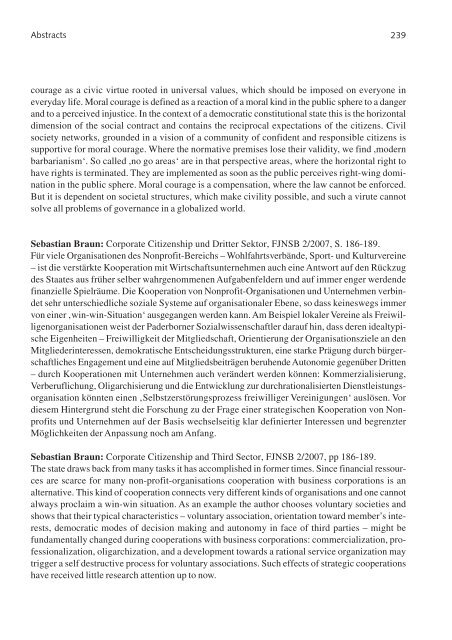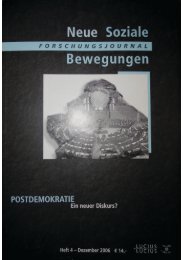schaft - Forschungsjournal Soziale Bewegungen
schaft - Forschungsjournal Soziale Bewegungen
schaft - Forschungsjournal Soziale Bewegungen
Erfolgreiche ePaper selbst erstellen
Machen Sie aus Ihren PDF Publikationen ein blätterbares Flipbook mit unserer einzigartigen Google optimierten e-Paper Software.
Abstracts<br />
courage as a civic virtue rooted in universal values, which should be imposed on everyone in<br />
everyday life. Moral courage is defined as a reaction of a moral kind in the public sphere to a danger<br />
and to a perceived injustice. In the context of a democratic constitutional state this is the horizontal<br />
dimension of the social contract and contains the reciprocal expectations of the citizens. Civil<br />
society networks, grounded in a vision of a community of confident and responsible citizens is<br />
supportive for moral courage. Where the normative premises lose their validity, we find ,modern<br />
barbarianism‘. So called ,no go areas‘ are in that perspective areas, where the horizontal right to<br />
have rights is terminated. They are implemented as soon as the public perceives right-wing domination<br />
in the public sphere. Moral courage is a compensation, where the law cannot be enforced.<br />
But it is dependent on societal structures, which make civility possible, and such a virute cannot<br />
solve all problems of governance in a globalized world.<br />
Sebastian Braun: Corporate Citizenship und Dritter Sektor, FJNSB 2/2007, S. 186-189.<br />
Für viele Organisationen des Nonprofit-Bereichs – Wohlfahrtsverbände, Sport- und Kulturvereine<br />
– ist die verstärkte Kooperation mit Wirt<strong>schaft</strong>sunternehmen auch eine Antwort auf den Rückzug<br />
des Staates aus früher selber wahrgenommenen Aufgabenfeldern und auf immer enger werdende<br />
finanzielle Spielräume. Die Kooperation von Nonprofit-Organisationen und Unternehmen verbindet<br />
sehr unterschiedliche soziale Systeme auf organisationaler Ebene, so dass keineswegs immer<br />
von einer ‚win-win-Situation‘ ausgegangen werden kann. Am Beispiel lokaler Vereine als Freiwilligenorganisationen<br />
weist der Paderborner Sozialwissen<strong>schaft</strong>ler darauf hin, dass deren idealtypische<br />
Eigenheiten – Freiwilligkeit der Mitglied<strong>schaft</strong>, Orientierung der Organisationsziele an den<br />
Mitgliederinteressen, demokratische Entscheidungsstrukturen, eine starke Prägung durch bürger<strong>schaft</strong>liches<br />
Engagement und eine auf Mitgliedsbeiträgen beruhende Autonomie gegenüber Dritten<br />
– durch Kooperationen mit Unternehmen auch verändert werden können: Kommerzialisierung,<br />
Verberuflichung, Oligarchisierung und die Entwicklung zur durchrationalisierten Dienstleistungsorganisation<br />
könnten einen ‚Selbstzerstörungsprozess freiwilliger Vereinigungen‘ auslösen. Vor<br />
diesem Hintergrund steht die Forschung zu der Frage einer strategischen Kooperation von Nonprofits<br />
und Unternehmen auf der Basis wechselseitig klar definierter Interessen und begrenzter<br />
Möglichkeiten der Anpassung noch am Anfang.<br />
Sebastian Braun: Corporate Citizenship and Third Sector, FJNSB 2/2007, pp 186-189.<br />
The state draws back from many tasks it has accomplished in former times. Since financial ressources<br />
are scarce for many non-profit-organisations cooperation with business corporations is an<br />
alternative. This kind of cooperation connects very different kinds of organisations and one cannot<br />
always proclaim a win-win situation. As an example the author chooses voluntary societies and<br />
shows that their typical characteristics – voluntary association, orientation toward member’s interests,<br />
democratic modes of decision making and autonomy in face of third parties – might be<br />
fundamentally changed during cooperations with business corporations: commercialization, professionalization,<br />
oligarchization, and a development towards a rational service organization may<br />
trigger a self destructive process for voluntary associations. Such effects of strategic cooperations<br />
have received little research attention up to now.<br />
239

















